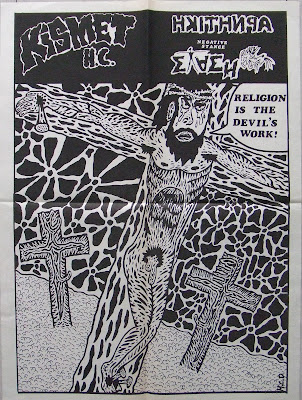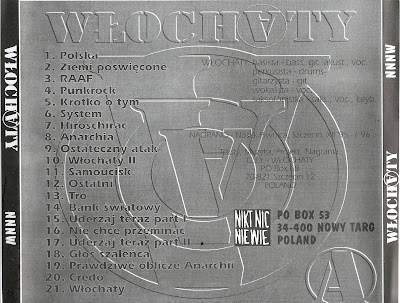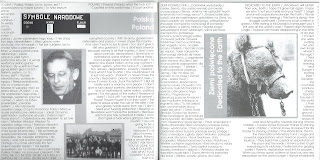This is the final part of Still Believing in ANOK and I hope the reads were fun and at least a little informative. If you need to show off on social media or indeed shine on online dating website, some details included in the write-ups (or, shall I say, the columns) can be used effectively as pick-up lines. Questions like "Did you know that the singer of Avaricious was Greek?" or "How many Enola Gays do you know?" are bound to impress, win hearts and make you look suave, sophisticated and, let's get real, weak-in-the-knees level irresistible. Do not hesitate to use them on a first date. The first time I met my wife, we talked about Polish hardcore bands form the 80's Rejestracja and Insekty Na Jajach so anything's possible.
To wrap up the series about the legacy of the 80's anarchopunk sound, let's talk about a band whose name means: "any of various plants with small, green leaves, used especially in salads". Yes indeed. Cress. The hippiest anarchopunk band from the 90's (and the 2010's). Not only is the band named after a plant instead of a warplane or some other cool punk shit, but they have a keyboard and a drum machine, used strobes, weird lights, a smoke machine, looked like soap-dodging versions of Jesus leaving one unsure if they are going to spread peace, love and riffs or if they are going to ask for a fiver so they can buy herbs. I even remember them screening political films while they were playing somewhere in Scotland, as if punks could concentrate on pogoing to the music AND focusing on a film at the same time. And yet, they are absolutely brilliant. Ian Glasper suggests in Trapped in a Scene that "had it been released in the Eighties, it (the Monuments Lp) would doubtless be heralded an anarchopunk classic today" and I cannot disagree. Of all the records I have been reviewing in the series, Monuments is the one that can objectively be called a genuine 90's classic the most. Beside being a famous work (even people who have never actually heard it know about it or at least can safely pretend to and if you feel the need to lie about knowing a record, it is already saying something about its status), I have never really read bad reviews. The Lp is unique because Cress are unique and I cannot really think of anything similar before and even after.
"But when, Grand Führer of the Perfect Punk Taste, did you first bump into Cress?". Well, I downloaded one mp3 file from a British website (I can't remember the name, it was in the early 00's) that offered songs from many quite a few bands of the era. Because internet connections were slower than an avant-garde French movie, there was only one song per band (I am aware that it must sound like the Dark Ages for Gen Z's who think youtube is as old as electricity) and it took about an afternoon to download two minutes of music. I think songs from the likes of Chineapple Punks, Riot/Clone or Ex-Cathedra were available. The Cress song was "TV screen" and I must confess that I did not like the song as it reminded me of the Ramones for some reason and I have always disliked them. To this day, I feel weird listening to this particular number and I cannot help imaging the Ramones with Northern accents playing their songs on shrooms and cider with a man playing the didgeridoo in the background. Which does not sound so bad after all. Some time after this precious mp3, I had the chance to visit a great punk record store in Bochum, Germany, and they had the Cress discography which, I was told, was much better than the Recharge Lp I was also coveting. I ended up buying both (I mean there was a free patch in the Recharge Lp) and got heavily into Cress, not so much that I grew a beard, which I have never been able to anyway, what with looking like an eternal teenager, but I did stop showering for a couple of weeks.
But what makes Monuments so special? Well, if you know a little about the history of alternative rock music in England, the cover depicting Stonehenge certainly indicates that the music and the band may have some sort of connections, literal or in inspiration, with the free festivals. Namely inventive psychedelic rock music, libertarian politics and the involvement of some anarchopunk bands in the 80's. Cress were not the first punk band to play with trippy psychedelic influences and atmospherics and 80's bands like Smartpils, Freak Electric, Hippie Slags and even The Mob claimed such influences. Later on in the late 80's/early 90's, Zygote, Bad Influence or Contropotere (and later on Iowaska), in their own specific way, also used psychedelic elements in the songwriting but none of these bands went as far as integrating a keyboard in the equation. A bold move that, interestingly, could also be found first in old-school crust bands like Amebix or Axegrinder, but also Χαοτικό Τέλος/Chaotic End or Counterblast, and although they used it differently the intent still had to do with creating a particular ambiance and atmosphere. Cress however went further as Monuments relied significantly on those long atmospheric passages providing narrative spaces and an epic ark for the story the album aimed to tell. It is beyond punk-rock and for all the apparent simplicity of the songs, and a lot of them are simple punk songs in the best Crass sense of the term, there are additional layers and textures and quieter trippier moments to widen the scope.
Monuments can thus appeal to different crowds. If you are fond of dynamic, tribal, anthemic anarcho punk-rock, or of Hawkwind-inspired rocking atmospheric punk music, or heavy crusty punk, Monuments has something to offer you, as long as you take acid beforehand. Often reduced to a Crass-like act (for the danceable directness of the riffs and some beats and the bloody name), Cress can also be defined as a heavy and dark band and I can hear Antisect influences in some of the mid-paced moments and of course in the vocal style and tone and anger of the two vocalists (In Darkness There is no Choice era) so that it is not surprising that they also appeal to crust lovers (the dreads and the scruffy look also help). This album works is versatile enough to work for all kinds of mood as well. It is Sunday morning, you are in a good mood because you only drank eleven pints the night before and you are looking for some UK punk-rock with tunes: Monuments. It is Monday night, it is pouring rain and work is killing you, you are looking for something heavy, snotty and angry: Monuments. You are on holiday and for the first time since April, you look up to the sky and, fuck me, these are stars, ain't they: Monuments.
The lyrics on the album are solid and tackle a wide array of subjects, some classic anarchopunk rants about progress, ecology or the capitalist class, other are more original "Monuments" is about the free unrestricted access to Stonehenge (the monument in question) and our common heritage, "Fear" is about the omnipresent fears that we have in society, fear of being unloved, alone, ignored, irrelevant, it is a great topic, genuinely personal and political. And apparently Cress don't like the police either for some reason. The album was released on Flat Earth Records (one of my favourite labels from that period) and the band recorded a split with Doom and an Ep before taking a break. Cress came back in the late 00's and since then have released a split Ep with Burnt Cross, a benefit Ep for the hunt sabs and a very solid split Lp with fellow psychedelic anarcho punks Buff from Manchester.
My copy was second-hand and there is some surface noise on a couple of songs so that you can enjoy the full - lesser - Terminal Sound Nuisance experience. Did I mention that one of the members was barefoot when I saw them in Paris in June. How many punk points does that make you lose?































